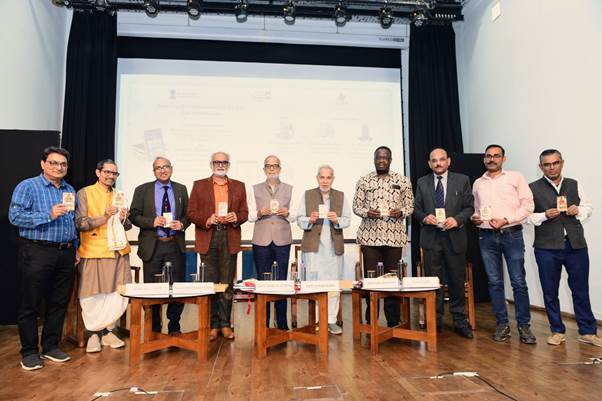New Delhi,24th November: Indira Gandhi National Centre for the Arts (IGNCA), Kalanidhi Division held a book launch and discussion of the book ‘Mapping of the Archives in India’ in the Samvet auditorium today. On this occasion Descriptive e- Catalogue of ‘Aagam- Tantra- Mantr- Yantra, Khand- 3, Bhag – 1-5’ was also launched. The book is authored by Prof. Ramesh Chandra Gaur and Vismay Basu and is published by IGNCA and UNESCO. The book launch session was chaired by Shri Ram Bahadur Rai , President, IGNCA Trust. The Guest of Honour of the event were Shri Satyananda Mishra, Chief Information Commissioner of India and Mr. Hezekiel Dlamini, Advisor Communication and Information for South Asia UNESCO, New Delhi Office. The distinguished speakers of the event were Dr. Sachchidanand Joshi, Member Secretary, IGNCA, Prof. Dr. Ramesh Chandra Gaur, Director(L&I) & Kalanidhi Division, IGNCA and Dr. Sanjay Garg, Deputy Director, National Archives of India.

Mr. Hezekiel Dlamini in his speech said it is always a pleasure for UNESCO to Come to IGNCA as both UNESCO and IGNCA are partners in their collective endeavour. He reiterated since ages archives have played an important role and history is underpinned by knowledge culture. “India as a dynamic and vibrant amalgamation of culture attracts the world to it” remarked Mr. Hezekiel Dlamini. He said, “the world is interested in diversity of culture and that is present in the length and breadth of the country and that also why UNESCO is interested in India”. He concluded by saying that archives are repository of knowledge and institutional and specialized archiving programme is of interest to UNESCO and that is prevalent in India. It will also provide plausible solutions to problems.

Prof. Ramesh Chandra Gaur extended a hearty welcome to dignitaries present and expressed satisfaction over the joint publication of book ‘Mapping of the Archives in India’ by IGNCA and UNESCO and over the publication of Descriptive e- Catalogue of ‘Aagam- Tantra- Mantra- Yantra, Khand- 3, Bhag – 1-5’. He informed the audience that the project began in 2018 however formally started in 2019. Thereafter, Covid happened which slowed the process of the work at hand. After literature survey 600 institutions in the country was found to have archives. The book contains 424 directories of archives of India. The book contains complete profile of the archives contained in the book. The book informs of the conservation, digitisation, and archivisation perspectives as well. He also mentioned the ‘Panch Pran’ of Prime Minister of India in context to feeling of Pride of our legacy and keeping that in mind we should be mindful of our legacy and that will happen through archiving of our legacy.
Dr. Sanjay Garg during his speech stressed on the history of archives in this country and said that there is a need of sustained and diligent effort in mapping the archives. He also elaborated on the dispersal mechanism of the archives and added that how religious institutions, educational and princely estates, State archives, Corporate archives are instrumental in dispersal. He further added that Banks have their own archives , there are judicial archives and custodial archives too. He also added there is an enormous heritage which we are at the risk of losing and this book wonderful attempt in safeguarding the heritage and legacy of this country. He concluded by saying that one nation one portal in this context would be beneficial.
Dr. Sachchidanand Joshi while addressing the gathering expressed his pleasure and pride in coming out of that with these publications inspite of hurdles faced by Covid and this has been possible because of continued effort of the people involved in it. He stressed we lack awareness amongst students and common people about the field and therefore should develop the science as much as possible. He concluded by saying that one should appreciate the people who work in this field and support them as it is because of them we have textual evidence of literature such as Mahabharata, Ramayana and Bhagvad Geeta.
Shri Satyanand Mishra during his address asserted that preserving and patronage of archives is important. He said “recreation of history using archival material brings to us the past alive”. This book is a pertinent initiative that leads to people in this field and researchers in the right direction.
Shri Ram Bahadur Rai, is presiding over the program. Congratulating (Dr.) Ramesh Gaur, he said that he has done a very commendable work. There is excellent information in this book. This should be read. Ram Bahadur Rai further said that the libraries which are closed need to be opened. Taking his point further, he asked whether information is accessible in museums. People are able to access information easily. The work that has been done today should have started earlier. Finally, concluding his speech, he said that the beginning is good, it can also be made a movement.

Comments are closed.